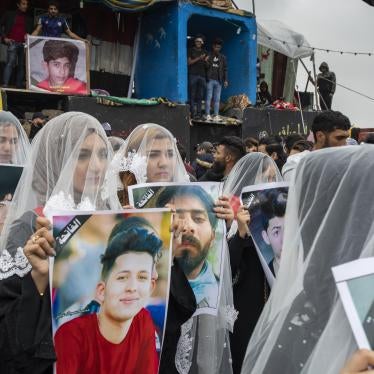Character assassination is a hot topic in Jordan these days as thousands of demonstrators, riding the winds of the ‘Arab Spring’, call for reform and accuse government officials and business leaders of abuseof power and corruption. Asking judges to put critical journalists behind bars is also popular among a ruling class that feels threatened by the sudden surge in revelations pouring out on the street and from the media.
The government of Prime Minister Maroufal-Bakhit is doing its bit to stifle free speech in the name of fighting corruption. A draft amendment to a law setting up an anti-corruption agency would punish people who spread “unjustified” rumors about corruption that “lead to insulting the reputation or infringing upon the dignity” of another person, with at least six months in prison. Taher Odwan, the government spokesperson, resigned over the proposed amendment on June 21.
Rather than add new provisions criminalizing defamation, Jordan should cancel those already in its penal code that send peaceful critics to jail for “insulting” the king or government institutions. In May, Secretary General of the Political Development Ministry Malek Twal promised that a new media strategy would reform those provisions. The government adopted the strategy in June, but it strangely remains unpublished. Instead, al-Bakhitsaid he would refer alleged character assassins to the courts.
Bakhit made good on his promise in late May by yanking a criminal defamation case against a journalist, Alaa al-Fazza, from a civilian court and referring it to the military-dominated State Security Court (SSC). The SSC prosecutor promptly detained Fazza for “working to change the constitution by unlawful means,” an offense punishable by death, based on an article he published about a Facebook group that supports the reinstatement of former Crown Prince Hamza, King Abdullah’s half-brother, whom Abdullah replaced with his own son Hussein. Allegedly among its members were 10 members of parliament and two former ministers, including Nabil al-Sharif, the former information minister who had brought the complaint against Fazza. Unlike Fazza, Sharif was not detained or investigated for suspected unconstitutional activities. Fazza is out on bail, but the case continues.
Fazza also incurred the wrath of police chief Husein al-Majali over an article that blamed him and the interior minister for allowing Khalid Shahin, a business tycoon convicted on corruption charges, to leave prison and the country for medical treatment abroad, never to return. The scandal cost the health and justice ministers their positions, and Majali filed a criminal complaint against Fazza for “spreading false rumors”. Fazza was spared in a general amnesty, but Majali in July filed a civil suit seeking 10,000 dinars [$14,100] in damages for harming the police department’s reputation.
Yahya Sa’ud, a member of parliament with roots in the town of Tafileh, was so upset over a June 13 Agence France-Presse (AFP) report that Tafileh residents attacked the king’s convoy on a visit there that he led protests seeking to have AFP Amman bureau chief, Randa Habib, referred to the SSC; two days later, a mob ransacked the AFP offices, and witnesses put Sa’ud at the scene. A police car stationed nearby to protect Al Jazeera’s offices did not intervene.
Al Jazeera correspondents have also been the victims of physical and verbal attacks. Two correspondents’ cars were smashed in March, and a policeman assaulted the bureau chief, Yasir Abu Hilala, while he was covering a demonstration in Amman on July 15. An internal police report on the incident, in which police beat 10 journalists and some protesters, stated that policemen “did not differentiate between protester and journalist” in their beatings “because of the angry commotion that took hold” of them following previous protests on March 25 in Amman and April 15 in Zarqa’, in which numerous policemen were injured.
The police report recommended referring the heavyhanded policemen to court, but Jordan has a dismal record in holding officials to account for violence. When police stood by while a pro-government gang attacked demonstrators in February, there was no investigation, a police spokesperson told Human Rights Watch. And police who failed to stop similar attacks on March 25 and then attacked protesters themselves also faced no charges. Sa’ud faces no charges and is free to launch new attacks on AFP.
Jordan is attacking free speech, both by pursuing journalists under draconian laws and by failing to hold police accountable when they stand by doing nothing — or even join in — when journalists are attacked.
--
* Christoph Wilcke is a senior Middle East researcher for Human Rights Watch*







